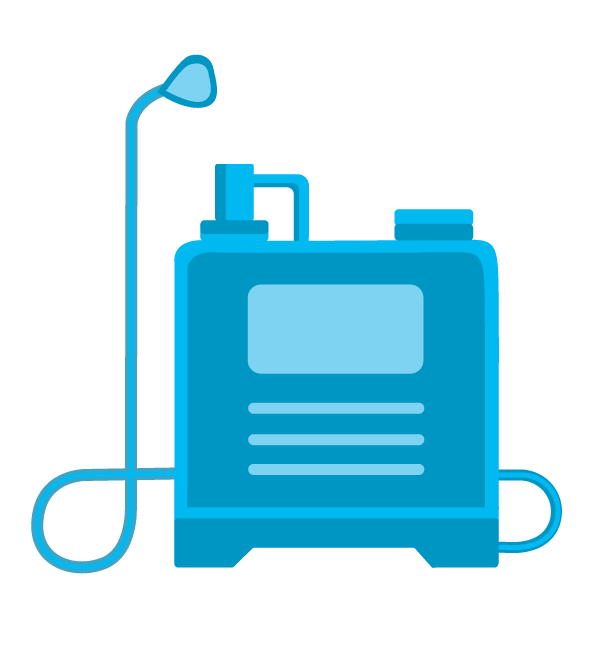Frequently Asked Questions
Warm Season: Herbicides should be applied early in the morning or during cooler periods of the day. Avoid spraying during intense heat, as rapid evaporation may reduce the herbicide's effectiveness. If applying herbicides during the rainy season, ensure that no rain falls for at least 4-5 hours after application to allow for proper absorption. To improve the efficacy of the herbicide, consider mixing it with a suitable binder and sticker, which will help the chemical adhere better to the target plants. Generally, herbicides should be applied when there is adequate humidity. This ensures that the herbicide's effectiveness is maximized.
Used pesticide packaging should never be reused. Ensure that the packaging is not exposed to fire or heat sources. Rinse the interior of the pesticide packaging with water (3) times. Use the rinsing solution in the sprayer, ensuring no waste is left behind. After cleaning, puncture the packaging to prevent reuse, then destroy it to ensure proper disposal. Dispose of the used pesticide packaging at designated waste disposal sites. Never wash pesticide packaging in wells, lakes, rivers, or streams, particularly those used for drinking water. Avoid throwing the packaging in inappropriate places.
Apply appropriate seed treatments to protect against pests and diseases. Select and cultivate resistant crop varieties to minimize vulnerability to pests and diseases. Regularly remove weeds both within the field and around its perimeter, as they can harbor pests and pathogens.
If the crop is experiencing excessive growth without fruiting, you may consider using Golden Arrow or Hyper-K. These products are designed to help regulate growth and promote fruiting.
Thank you for your inquiry. To purchase Shwe Pesticides and Zebra Fertilizers, you can contact our customer service center at +959 899 090 595 or visit your local authorized retailers.
The most effective time to apply foliar fertilizers is early in the morning, typically between 3 a.m. and 8 a.m., when the stomata of the plants are open due to cooler temperatures, allowing for stronger absorption. It is important to avoid using foliar fertilizers when there is a pest outbreak, as this may not be suitable and could interfere with pest control measures.
Generally, insecticides and fungicides are best applied early in the morning or during the cool hours of the evening. Avoid spraying during periods of intense heat, as this can reduce effectiveness and increase the risk of plant damage.
Morning Applications: During the early morning, plant cell turgor is high due to the cooler temperatures from the night, which can reduce absorption rates.
Evening Applications: Evening spraying is often more effective, as absorption rates are higher, and many pests are more active and feeding during nighttime hours.
Agro-chemicals should be stored in a manner that ensures their safety and effectiveness:
Keep them in a location protected from direct sunlight.
Store in a cool, dry, and well-ventilated area to prevent degradation.
Ensure the storage area is secured and out of reach of children.
In general, the usability of expired agricultural chemicals depends on several factors, including the chemical nature and stability of the active ingredient, the formulation type, the integrity of the packaging, and the storage conditions such as temperature and exposure to light.
If the agricultural chemicals contain sulfur and copper, they should not be used together with other chemicals, as this can lead to phytotoxicity. If necessary, insecticides and foliar fertilizers may be applied together under standard conditions. However during a pest outbreak, they should be applied separately to ensure effectiveness. Fungicides, Bactericides, Herbicides should not be used together. Each must be applied separately to avoid adverse interactions and ensure optimal efficacy.
GET IN TOUCH











